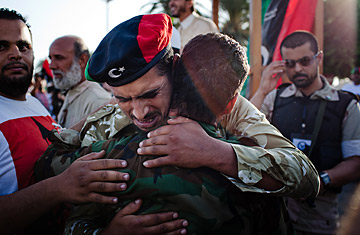
Libyan rebels celebrate 'Id al-Fitr, the Muslim holiday that marks the end of Ramadan, on Aug. 31, 2011 in Tripoli
In June, when Walid Tarsin heard that rebels in the city of Zintan (150 km southwest of Tripoli) were short on medicine and hospital supplies, the pharmacist decided to act. He canvassed the hospitals in Tripoli, stealthily gathering all the provisions he could without arousing too much suspicion. He filled up his Mercedes with the contraband and set forth from the capital to make the two-and-a-half-hour journey between 3 p.m. and 5 p.m. in the afternoon. "That is when it is the hottest part of the day," the 45-year-old pharmacist says. "The men guarding the checkpoints were often too fatigued by the heat to make diligent checks." A number of Tripoli residents shared stories similar to Tarsin's. They risked imprisonment and even death to help the rebels who were fighting to end the 42-year rule of Muammar Gaddafi.
When the revolution began in February, Gaddafi's security forces stepped up their presence in the capital. They put more agents on the streets and monitored everything from phone calls to sidewalk conversations. Residents feared discussing even the most innocuous subjects with people outside their families. Though he knew the potential danger of betraying Gaddafi, Colonel Salim Sharif was equally aware of the cost of remaining aloof from the conflict. "I knew working with the rebels could get me in a lot of trouble," the air-defense officer says as he welcomes his fighters who have just returned from patrolling the neighborhoods of Tajura. "But I had to do it for my country. [Gaddafi] was killing us."
Sharif decided soon after the Feb. 17 revolution to throw his lot in with the rebels. He made contact with like-minded soldiers who were in touch with anti-Gaddafi forces in the east. Through their efforts, an intricate network of secretly rebellious officers emerged, which relayed sensitive information about Gaddafi troop movements to officials in the eastern city of Benghazi, which had become the capital of what was called Free Libya. Sharif was particularly vigilant about flights from Algeria carrying mercenaries. "I gave the information to my superior and they sent it on to Benghazi," the colonel boasts. "We helped the revolution. We did many things like this that no one knew about."
Two people who did know of Sharif's contributions were the rebels' political chief Mustafa Abdel-Jalil and his former Deputy Prime Minister, Ali al-Issawi. Jalil told representatives from the African Union in April that mercenaries fighting with Gaddafi had come from Algeria. When asked by the Arab newspaper al-Sharq al-Awsat about the allegation, al-Issawi said, "We have more evidence than is present in the media." Sharif says their statements came directly from the information he passed on to Benghazi.
As rebel forces closed in on Tripoli in early August, Dr. Imad al-Hitushi prepared his clinic to service their wounded. He relayed word to their leaders in Zawiyah that his medical facility was ready to treat their injured. "We heard so many stories about rebels dying in the battlefield," says the ophthalmologist in his small five-bed clinic in the Dahara section of Tripoli. "I called other doctors — surgeons and [gastro-intestinal] specialists and told them to be ready." When the fight arrived in Tripoli on Aug. 20, they were ready. Al-Hitushi and his fellow doctors treated dozens of rebels wounded by gunfire and others who were roughed up by Gaddafi forces. "If the [Gaddafi] brigades would have discovered what we were preparing, we could have been arrested. But we did not care. We wanted to protect the people protecting us."
At his house in the wealthy neighborhood of Gharghur, Tarsin greets mourners who have gone to pay their condolences for the death of his nephew Malik. He died while trying to kill a sniper terrorizing the posh district after fighting erupted throughout the capital on Aug. 21. "We all did our part for the revolution," he says solemnly. "We don't want any prizes and rewards. We just want our freedom."
